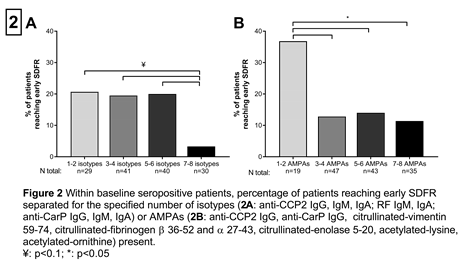Session Information
Session Type: ACR Concurrent Abstract Session
Session Time: 9:00AM-10:30AM
Background/Purpose: The autoantibody response of seropositive RA is very diverse and consists of various numbers of isotypes and antibodies to multiple post-translational modifications. It is yet unknown whether this varying breadth of the autoantibody profile associates with treatment outcomes. Therefore, we aimed to comprehensively characterize the number of isotypes and anti-modified peptide antibodies (AMPAs) present in RA and investigate whether the breadth of the autoantibody profile, as a reflection of the underlying immunopathology, associates with early treatment response and rates of sustained drug-free remission (SDFR).
Methods: In baseline sera of 399 seropositive RA patients in the IMPROVED study1, we measured IgG, IgM, and IgA isotypes for anti-cyclic citrullinated peptide-2, rheumatoid factor, and anti‐carbamylated protein antibodies, and reactivity against 4 citrullinated peptides (vimentin 59-74, fibrinogen β 36-52 and α 27-43, enolase 5-20) and 2 acetylated peptides (lysine and ornithine). We investigated associations between autoantibody profile and 1) change in disease activity score (DAS)-44 between 0 and 4 months and 2) sustained drug-free remission (SDFR) (drug-free DAS44<1.6 lasting ≥1 year).
Results: A broad baseline autoantibody isotype profile dose-dependently associated with a favourable early treatment response: ΔDAS 0-4 months of 7-8 vs 1-2, 3-4, and 5-6 isotypes, respectively: -2.2 vs -1.5 [p<0.001], -1.7 [p=0.04], and -1.8 [p=0.04] (Figure 1). A similar trend was observed for AMPA-number. Conversely, a broad autoantibody profile was associated less chance of achieving early SDFR between 1-2 years (Figure 2). In the long run (2-5 years), not the breadth of the autoantibody response, but rather seropositivity per se was associated with not achieving SDFR.
Conclusion: Not only the presence of autoantibodies, but also the breadth of the autoantibody profile has prognostic value in RA. Seropositive patients with a broader autoantibody profile have a better early response to immunosuppression, likely reflecting an active but readily suppressible humoral immunity. However, in the long-term this autoimmunity cannot be quenched without continued therapy.
References: 1Heimans, AR&T 2016, 18:23
To cite this abstract in AMA style:
de Moel E, Derksen V, Trouw L, Bang H, Goekoop RJ, Speyer I, Huizinga T, Allaart C, Toes R, van der Woude D. The Presence of a Large Number of Autoantibodies at Baseline Is Favourable for Early Treatment Response but Unfavourable for Drug-Free Remission in RA Patients [abstract]. Arthritis Rheumatol. 2017; 69 (suppl 10). https://acrabstracts.org/abstract/the-presence-of-a-large-number-of-autoantibodies-at-baseline-is-favourable-for-early-treatment-response-but-unfavourable-for-drug-free-remission-in-ra-patients/. Accessed .« Back to 2017 ACR/ARHP Annual Meeting
ACR Meeting Abstracts - https://acrabstracts.org/abstract/the-presence-of-a-large-number-of-autoantibodies-at-baseline-is-favourable-for-early-treatment-response-but-unfavourable-for-drug-free-remission-in-ra-patients/


